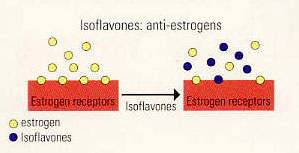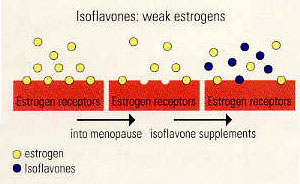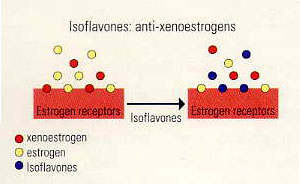
- Ease Menopausal Symptoms
When estrogen levels drop during menopause, many women resort to hormone replacement therapy (HRT). However, HRT increases the risk of serious health problems like heart attack, stroke, breast and ovarian cancers, dementia and Alzheimer’s disease. Fortunately, isoflavones provide a natural and safe alternative for alleviating menopausal symptoms such as hot flushes, night sweats, sleeplessness, palpitations, mood swings, anxiety, agitation, difficulty in concentrating, forgetfulness, headaches, urinary incontinence, and vaginal dryness.
- Preserve Fair, Youthful & Radiant Skin
Isoflavones (potent antioxidants) neutralise free radicals that can damage your complexion. They keep skin hydrated and moisturised by boosting its natural moisturising factors (NMFs), including Hyaluronic Acid. Isoflavones also enhance the production of collagen and elastin fibres, and prevent their breakdown to ensure that skin remains firm, smooth and wrinkle-free. Isoflavones make an excellent “internal sunblock” as they have been shown to protect the skin from the damaging and darkening effects of UV rays. Your skin will glow with youthful vitality. - Reduce Cardiovascular Risk
Soy isoflavones also appear to reduce the risk of cardiovascular disease by improving cholesterol profiles – increasing “good” HDL cholesterol and reducing “bad” LDL cholesterol, and inhibiting the growth of cells that form artery-clogging plaque that can lead to strokes or heart attacks. - Improve Bone Health & Prevent Osteoporosis
Soy isoflavones help to fight osteoporosis by preserving the bone matrix, slowing down bone and calcium loss. In fact, isoflavones can increase bone density and strengthen bones. - Lower Cancer Risk
Isoflavones provide protection from several hormone-dependent cancers including those of the breast, ovarian, prostate gland and colon. They act against cancer cells in a manner similar to many common cancer-treating drugs (including Tamoxifen) which block estrogen, thereby blocking off the detrimental cancer-promoting effects of excess estrogen and xenoestrogen. Studies have also shown that isoflavones can reduce the risk of cancer by preventing free radical damage to DNA. They can also stop the growth of some cancer cells through the inhibition of DNA replication and reduction in the activity of various enzymes. - Strengthen Hair & Prevent Hair Loss
One of the most common causes of hair loss when men and women grow older is excess Dihydrotestosterone (DHT), the hormone that reduces blood supply and nutrients to hair follicles. This causes hair to become increasingly thinner. The follicles then eventually stop producing hair at all. A study published in the Biology of Reproduction Journal, reveals that soy isoflavones can reduce hair loss by blocking the effects of DHT.
Isoflavones Are Great For Young Women As They Alleviate PMS!
Female health is heavily influenced by the hormone estrogen, beginning with the first period. Taking isoflavones during puberty, when the breasts are developing, may reduce the risk of fibroids and endometriosis, and protect a woman later in life against cancer. Isoflavones help to balance hormones and ensure problem-free menstruation and alleviate Premenstrual Symptoms (PMS) like abdominal cramps, backache, fatigue, breast tenderness, bloating, skin breakouts, headaches and irritability.
Great For Men Too!
Some men fear that isoflavones may have a feminising effect on them. This misconception has been proven wrong again and again through many scientific studies, including one published in the Mar 2002 issue of the Journal of Nutrition. Men enjoy protective health benefits from isoflavones, including the lowering of cholesterol levels, and cardiovascular risks. In fact, studies have shown that isoflavones can help protect against prostate enlargement and reduce the risk of prostate cancer. A Japanese study published in the Journal of Nutritional in Aug 2007 concluded that isoflavones reduce the risk of prostate cancer by 58%!
Soylife®: Potent Isoflavones for Better Health and Beauty Benefits
Although all soy isoflavones are beneficial to health, not all isoflavones are created equal. Most soy isoflavones are extracted from whole soybeans, where as SoyLife® is made from only soy germ that contains more active and bio-available isoflavones (60% diadzin as opposed to 15% in those from whole soybeans).
Although the soy germ makes up only 1-2% of the entire soybean, it contains 4x more micronutrients, including phytic acid, lecithin, fibre, Vitamin E, oligosaccharides, Gamma Tocopherols, phytosterols, essential fatty acids, saponins, protein, and others. Scientists observe that the bio-availability and effectiveness of isoflavones are synergistically enhanced by these micronutrients.
SoyLife® is prepared from non-genetically modified soy germ, using an advanced proprietary non-chemical process. Be wary of isoflavones that are chemically extracted. Hexane and Butanol (the chemicals most often used to extract isoflavones) can be very toxic to the liver, and may even be carcinogenic!
Xenoestrogens Are Wreaking Havoc In Your Body!
Xenoestrogens are estrogen mimickers in chemical form that can disrupt hormonal activity. Common sources of xenoestrogen include growth hormones in poultry, meat and milk, food preservatives, food colourants, pesticides, insecticides, weed killers, dioxins and polychlorinated biphenyls (PCBs) polluting the ocean, plastic containers and cling wrap (for food), inner linings of cans and tetra packs, detergents, lotions, baby bottles, toys your children play with, etc.
The effects of xenoestrogen have been observed in many children today and in the inappropriate growth of mammary tissue in men (“man breasts”).
How Do Isoflavones Exhibit Both Estrogenic & Anti-Estrogenic Effects?
 |
When natural levels of estrogen are high (for example during puberty), isoflavones bind to the alpha-receptors and prevent excess estrogen from binding with these receptors. This decreases the health risks associated with excess estrogen. |
 |
When natural levels of estrogen are low (for example during perimenopause or menopause), isoflavones help by activating the beta-receptors. Isoflavones can compensate for low estrogen levels by binding to the same receptors, thereby easing menopausal symptoms. |
 |
Xenoestrogens are implicated in various types of cancers. Isoflavones that exert weak estrogenic effects compete with xenoestrogen for binding sites on estrogen receptors in the body. This reduces the number of xenoestrogens that can bind to estrogen receptors, thereby reducing the ill effects of xenoestrogen. |